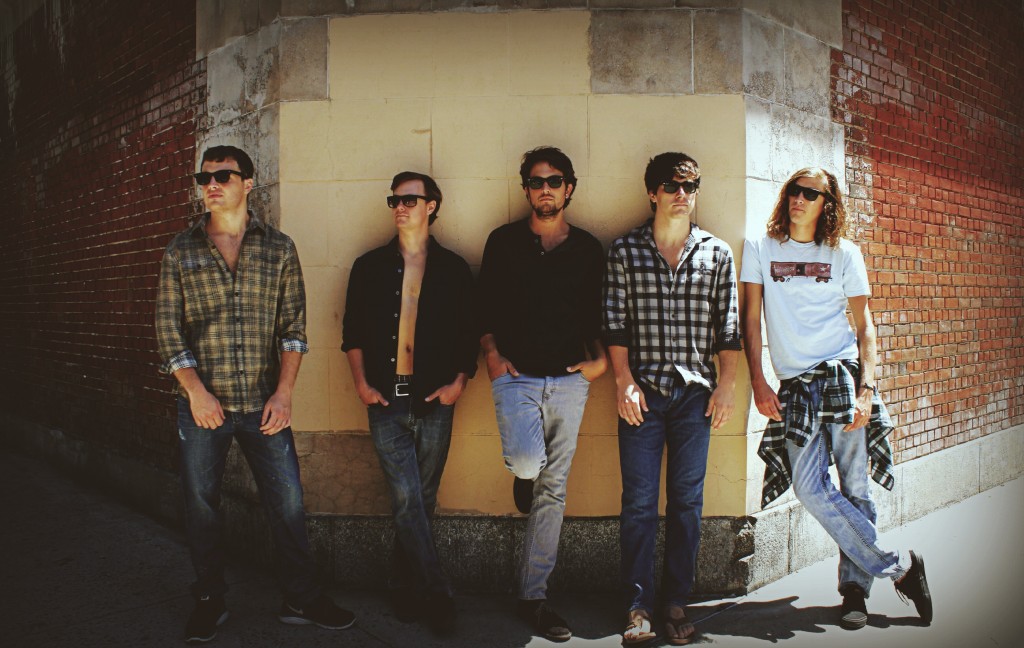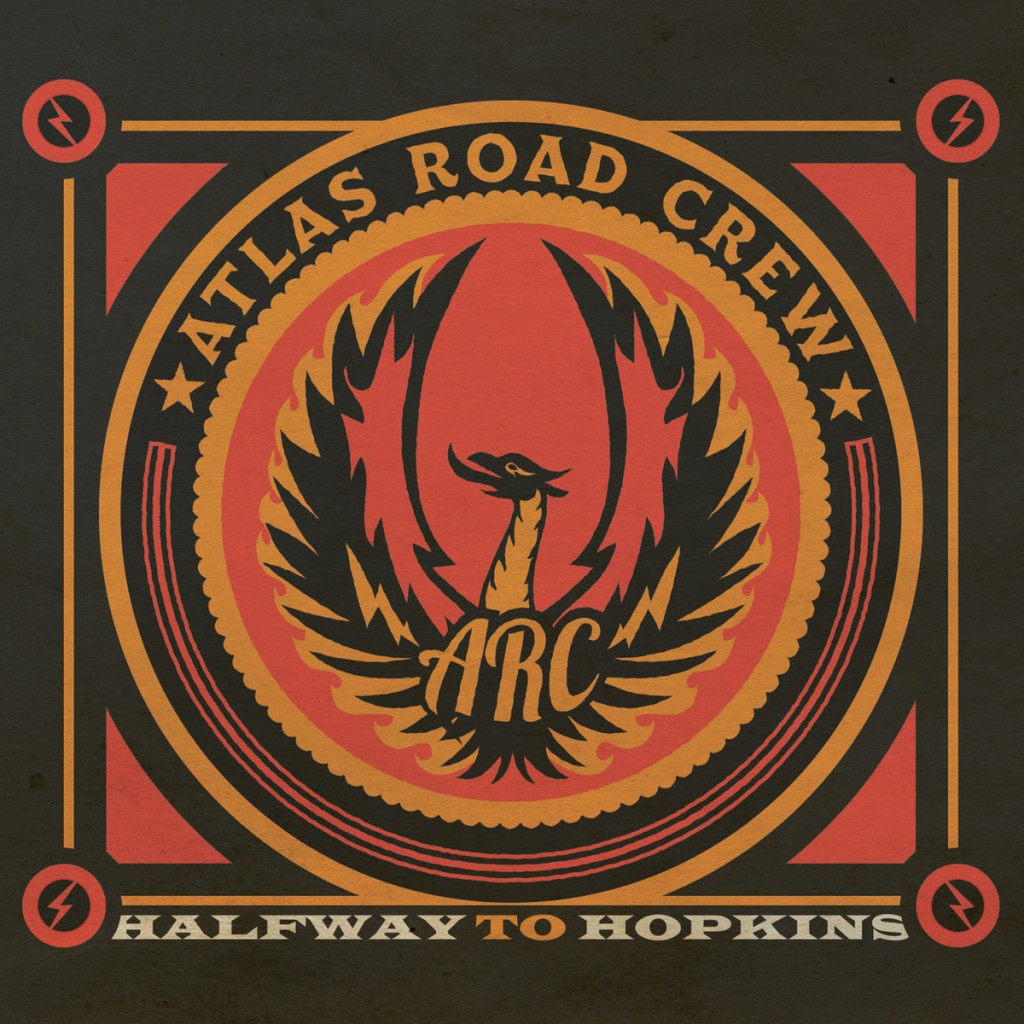Review & Interview: Atlas Road Crew’s ‘Halfway to Hopkins’
Columbia-born, Charleston-based rock band Atlas Road Crew has a sturdy, glossy, mostly bluesy new studio album in hand, and they’ll celebrate its recent release with an official CD release show at the Music Farm this weekend. Halfway to Hopkins is an impressively produced debut for the group — one that shows a growing maturity and sense of focus.
Lead singer/guitarist Taylor Nicholson, lead guitarist Dave Beddingfield, bassist Max Becker, drummer Patrick Drohan, and pianist/organist Bryce James tracked the 11-song collection in three different studios over the course of five months— with Rick Beato at Black Dog Sound studio in Atlanta, with Cory Plaugh at Plaugh’s House Recording Studio in Lexington, and with Jay Clifford at Hello Telescope in Charleston.
In their latest press kit, the band describes their latest material as a kind of “twangy, swampy Southern rock ‘n’ soul that one might expect to come out of a Muscle Shoals session in the 1970’s … but it’s as immediate and fresh as anything on the contemporary scene.”
Full-bodied and well polished, we found that Halfway to Hopkins offers a big, radio-ready production quality while demonstrating the band’s evolving skill as a songwriters, lyricists, and musicians. Some moments borrow heavily from the bluesy-rock, double-guitar grooves of the Rolling Stones and the Black Crowes. Others boast a fine ear for strong riffs, majestic choruses, and pop melodies.
Halfway to Hopkins opens with strong, riff-filled funk-rocker titled “Voices,” a fan favorite with a healthy dose of Black Crowes swagger and soul. It’s a bold, anthemic kick-off replete with rich harmonies, Hammond organ, and fiery guitar solos. If “Voices” shows off the band’s Black Crowes leanings, the follow-up track “Black Eye Sunrise” switches gears toward the more modern alt-rock side of things, a la Kings of Leon and R.E.M.
Early in the set, the upbeat, slide guitar-driven “Low Country Blues” sounds like Widespread Panic on a caffeine bender, but then the strummy, breezy “Wasted Time” and power chord-heavy “Lose Control” both roll confidently like a slow-groovin’ anthems. The title track, “Halfway to Hopkins,” is deeply rooted in the band’s long-running Southern garage rock twang.
Becker’s chordal bass line propels one of the catchiest modern pop-rock tunes on the disc, the crisp and melodic “I Want You to Know.” The acoustic guitar-based waltz “Weeping Will” steps away from the hard-hitting Southern rock approach, too. With extra doses of echo and reverb, the spacious rockers “Abilene” and “Betty” — the album-closing double shot — rumble with John Bonham-style rhythms and U2-esque guitar effects.
This week, Metronome Charleston caught up with drummer Patrick Drohan for an interview about the music and style of Halfway to Hopkins and the band’s plans for the rest of 2015:
Metronome Charleston: The production quality is impressive on Halfway to Hopkins — big, full, clean tones and sounds, tight arrangements, tasteful instrumentation and harmonies. Altogether, what was the band’s game plan going into these studio sessions?
Patrick Drohan: Thanks, man! That was exactly the sound that we were going for with this album — big, full, rock ‘n’ roll … something that you can crank in your car speakers.
Metronome Charleston: What were the biggest challenges for you as a drummer and as part of the rhythm section during the making of Halfway to Hopkins? Did any of the three producers push or guide you to new territories at all?
Patrick Drohan: The biggest challenge for me was that I had to go first when tracking. The way we recorded this album — the drums recorded first, then bass, then guitar, and so on. I would record the drums that we had done in rehearsal, then again after hearing a new guitar part or bass line that Dave or Max recorded. Looking back, sometimes I wish I’d changed up the beat a little bit, but, hell, I’m the drummer. What do I know, right?
Metronome Charleston: Did the process of conducting three different studio sessions with three different producers/engineers in three different towns create a challenge for the band — perhaps a challenge to achieve a cohesive sound for the collection? Or did breaking things up allow for a less stressful, low-pressure, more sane approach to doing certain songs in small batches?
Patrick Drohan: I think using three different studios kept the recording process exciting for us. There’s nothing like walking into a big venue that your’e going to play for the first time, and the same goes for a studio. Naturally, you want to try everything out, twist every knob, see what tones you can get from your instrument. The whole process was amazing.
Metronome Charleston: Did you have any favorite classic, modern, or obscure rock albums or rock drummers in mind as you went into recording these songs — whether in style or drum sound or attitude?
Patrick Drohan: I’m not gonna lie; I listened to The Black Crowes’ Shake Your Money Maker a few times before we went into the studio. Sometimes I’ve got to remind myself that less is more in the studio. Drums that walk all over everyone else’s part just sound terrible and make you look like a jackass.
Metronome Charleston: Listening back to the tracks, which ones are your own personal favorites on Halfway to Hopkins, and why?
Patrick Drohan: I really like “Black Eye Sunrise” and “I Want You To Know.” I think both recordings really capture the energy perfectly. It’s great when you get get a recording just right.
Metronome Charleston: Which of these songs sound strongest live on stage, and why?
Patrick Drohan: “Voices” is really strong for us. It gives Taylor a time to really belt out a loud rock chorus, and Dave can go off on a raging guitar solo.
Metronome Charleston: Which of these songs have changed or readjusted the most on stage — maybe by taking on a more “live” personality?
Patrick Drohan: “Halfway To Hopkins” and “I Want You To Know” have changed the most to make them more exciting live. Sometimes the little intricacies that are picked up in the studio don’t sound as good in a high-energy live setting.
Metronome Charleston: If you had to honestly list your top five influential drummers, who’d make the list, and why?
Patrick Drohan: Travis Barker from Blink 182 is who I listened to most when I first started to play the drums. I still do. He’s incredible; so fast but intricate at the same time, and not sloppy. I love John Bonham’s hard-hitting, steady style as well. Jon Fishman from Phish is also an influence of mine. His “tension and release” style of playing is phenomenal. Love me some Mitch Mitchell and Keith Moon, too.
Metronome Charleston: Currently, who are some of your least favorite contemporary “rock” bands on the national scene, and who are some of your favorite?
Patrick Drohan: I don’t really get the whole Imagine Dragons thing. Like, why does everything have to be so huge and “Ohwoaaahaooooo!” all the time like we’re in some Tom Cruise post-apocalyptic movie? I don’t know; that’s just me. Different strokes for different folks. Bands that I’m really digging right now are the Weeks, J. Roddy Walston and the Business, the Districts, and Moon Taxi.
Metronome Charleston: In which ways has Atlas Road Crew tightened up the most over the last two years or so?
Patrick Drohan: We’ve gotten pretty good at touring over the past two years, in my opinion. By “good,” I mean it’s not a surprise of how early we need to leave one city to get to the next to load in, sound check, etc. We know not to buy lottery tickets in the state of Alabama. We know its probably not a good idea to stay up until sunrise when we have four shows left in a run. We know how these venues work now, who to talk to, where things are, all of that. In my mind, our playing has improved over the years, too, just by simply playing these songs over and over again, but we’re constantly trying to get better and expand on our playing otherwise things will get boring.
Metronome Charleston: What kind of a rock band is Atlas Road Crew evolving into in 2015?
Patrick Drohan: Our style is turning into that of a band that might have it’s three-and-a-half minute song recorded, but we’re not afraid to jam on it live.
Metronome Charleston: Musically and artistically, how can the band best move forward?
Patrick Drohan: By “moving forward,” I’m going to interpret that as evolving/keeping things new and exciting for the band and it’s fans.
Metronome Charleston: As the drummer for Atlas Road Crew, what would you most like to achieve in 2015?
Patrick Drohan: I’d like to play in front of as many people as possible!
Metronome Charleston: When people compare Atlas Road Crew to other bands, what have been the weirdest or most offensive you’ve heard so far?
Patrick Drohan: We haven’t received many odd comparisons but we did get a request for a Tim McGraw song last weekend. I think we’ve gotten a Michael McDonald request one time, too. Like, I understand the “Freebird!” and “Wagon Wheel!” chants but … “Michael McDonald! Play that real obscure deep track from his 1981 release!”
Metronome Charleston: On the road and at local gigs, what’s your poison, and why?
Patrick Drohan: Love me some Makers Mark … if it’s purchased for me.
Metronome Charleston: What might a newbie who’s never seen Atlas Road Crew expect at your Music Farm next week? What might surprise them the most?
Patrick Drohan: Expect a rock ‘n’ roll show. Get boozed up, have some fun, dance with someone you’ve never met — make some mistakes. Don’t be afraid to get wet.
Atlas Road Crew shares the stage with Delta Saints at the Music Farm on Fri. March 20 at 8 p.m. Admission is $5 for students and $10 at the door (general). Visit atlasroadcrew.com and musicfarm.com for more.
Top photo by Sean Money and Elizabeth Fay.
Comments
Powered by Facebook Comments








